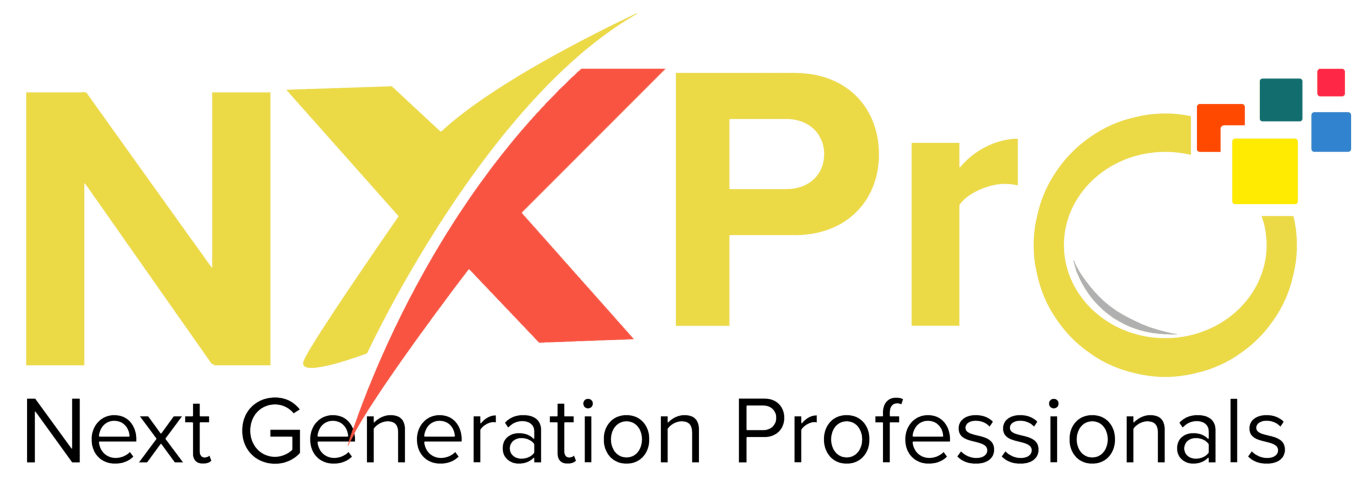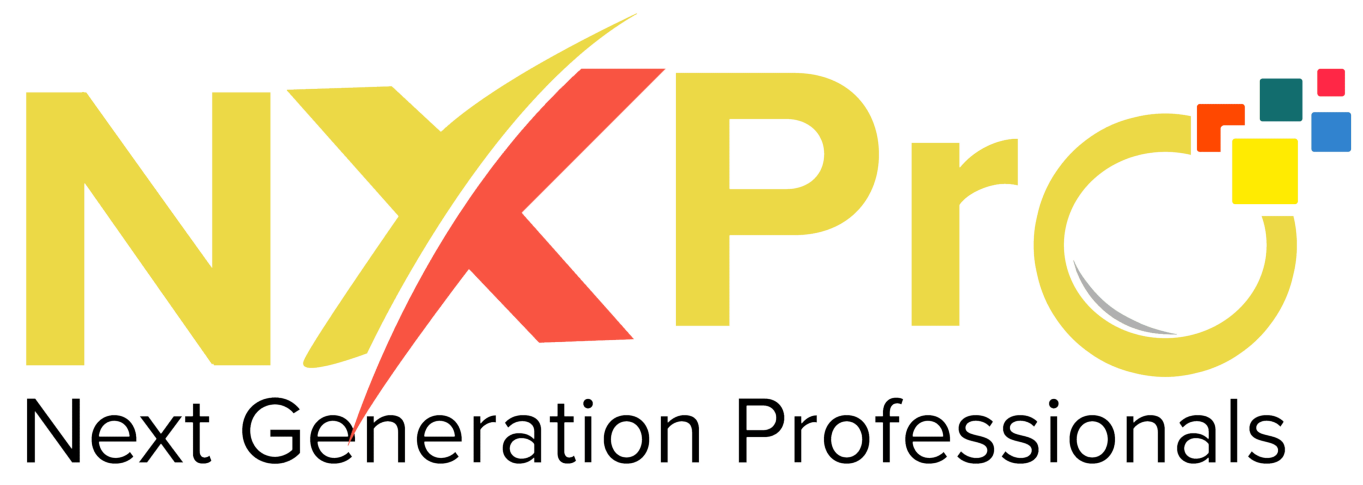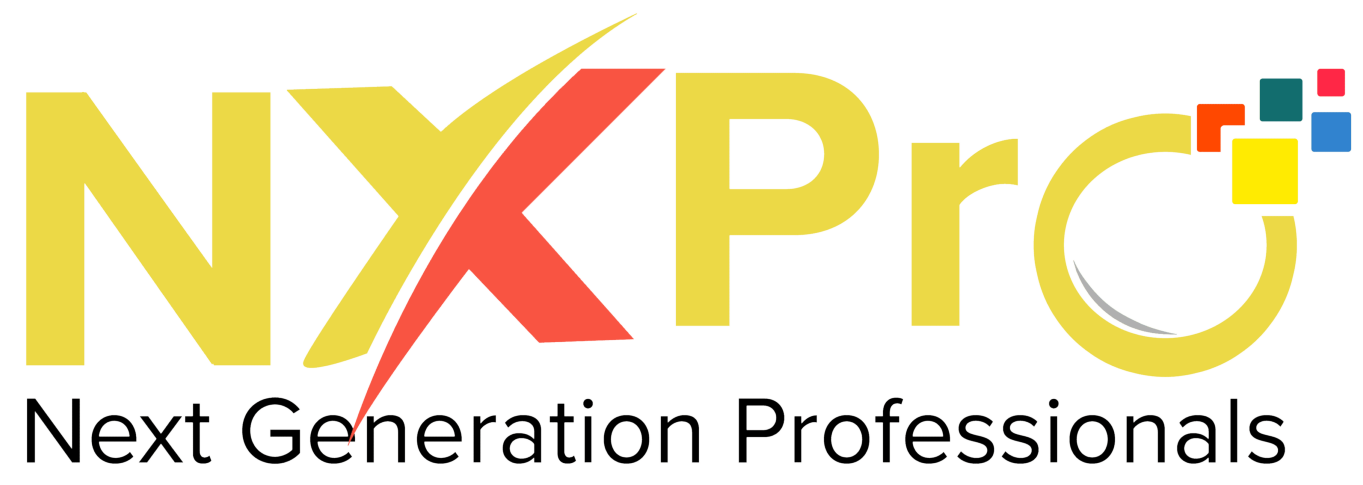Top SEO Changes of 2025: What Every Marketer Must Know
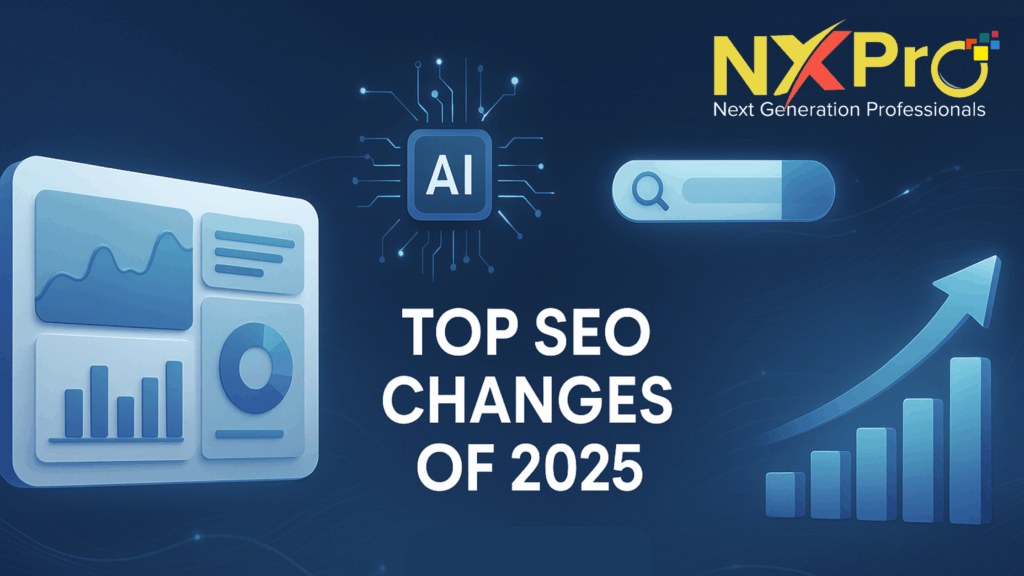
The world of SEO is changing faster than ever. What worked even a year ago doesn’t guarantee results today. With AI reshaping search behavior, Google rewriting quality guidelines, and user intent evolving rapidly, 2025 has introduced some of the biggest shifts in the digital marketing landscape. If you want your brand to stay visible online, this is the year you can’t ignore SEO changes. As a leading provider of SEO services, NXPRO has analyzed these updates closely to help businesses stay ahead of the curve. Here’s a deep dive into the most important SEO changes of 2025—and how you can adapt. AI Search Is Now the New Normal In 2025, Google and major search engines expanded AI-driven search, delivering AI Overviews, summarized answers, and conversational-style results right at the top of the page. This means fewer clicks on traditional blue links and more emphasis on providing answers instantly. Why this matters Websites must optimize for answer engine optimization (AEO) Content must be structured, fact-rich, and easy for AI to interpret Entities, schema markup, and context matter more than keywords At NXPRO, our SEO services now include AI-search optimization, focusing on structured content, improved metadata, and conversational query targeting. E-E-A-T Is Now Stronger Than Ever Google has increased its focus on Experience, Expertise, Authority, and Trust (E-E-A-T). Websites without strong credibility signals saw massive ranking drops in 2025. Key credibility signals now required: Author bios with real expertise High-quality citations and references Trust badges, certifications, real company details Transparent policies and strong user engagement Google wants real experts creating content, not generic AI text. NXPRO helps brands build authority using strategic content planning, author profiling, and digital reputation signals. Multimodal Search Has Arrived 2025 is the year Google integrated multimodal search, combining: Text Images Voice Screenshots Real-time context Users can now search by snapping a photo, recording a question, or combining text + image. This means businesses need to optimize not just their written content, but also visuals, product images, infographics, and even screenshots. What to do: Add alt text rich in keywords Use high-quality product photos Optimize images for fast loading Create content that answers visual-based queries NXPRO’s SEO services include full multimedia optimization to help brands rank in this new search landscape. Google’s Quality Algorithms Have Become Stricter Google’s Quality Algorithms Have Become Stricter The Core Updates of 2025 focused heavily on: User satisfaction Search intent match Time-on-page Content value Thin, repetitive, or AI-generated content without depth got penalized. Google now evaluates: Depth of knowledge Real-world usefulness User behavior metrics Topic authority This means long-form, helpful, research-based content is essential to survive. NXPRO helps clients create authority content clusters, allowing brands to become trusted leaders in their niche. Zero-Click Searches Have Increased Dramatically With AI Overviews, rich snippets, and instant answers, 2025 saw a massive rise in zero-click searches. To stay visible, marketers must: Target long-tail keywords Add FAQs and structured Q&A content Optimize for featured snippets Use schema markup aggressively NXPRO’s SEO strategies now include snippet-focused optimization to capture visibility even when users don’t click through. Local SEO Is Now Entity-Based Google is shifting from keyword-based local SEO to entity-based local SEO, which focuses on: Brand identity Local relevance Reputation signals Verified information across the web Local businesses need to maintain: Accurate NAP Strong local backlinks Consistent map listings High-quality customer reviews NXPRO offers powerful local SEO services to help businesses rank in local searches, Google Maps, and “near me” results. Core Web Vitals 2025 Update: Speed & UX Matter Even More User experience is now tied directly to ranking. The 2025 update focuses on: Interaction-to-Next-Paint (INP) Cumulative Layout Shift (CLS) Loading speed Responsiveness Visual stability Websites that load slowly, shift elements, or interrupt users with intrusive ads are losing traffic. NXPRO’s technical SEO team improves site speed, mobile experience, and overall UX to ensure strong ranking signals. Starter $ 300 /Month SEO audit & roadmap Google Business Profile 2 local citations/month Backlinking Contact Now Sale Growth $ 600 /Month Everything in Starter 2 new pages/posts/month Technical SEO sprints backlinks Conversion tracking & dashboard Contact Now Sale Scale $ 900 /Month Dedicated SEO Manager Location page network Digital PR & data-driven content Guest Blogging eCommerce SEO Contact Now Sale Backlinks Still Matter—but Quality > Quantity Spam updates in 2025 wiped out thousands of low-quality backlinks. Google is now prioritizing: Editorial links Contextual mentions Digital PR placements High-authority niche websites NXPRO focuses on ethical, high-quality link-building that aligns with Google’s latest guidelines. Topical Authority Is the New Ranking King Google now ranks websites based on how deeply they cover a topic, not how many keywords they target. To build topical authority: Publish clusters of related blogs Cover all subtopics in your niche Create pillar pages that connect everything Use internal linking strategically NXPRO’s content strategy is built around topical authority, helping websites rise in rankings naturally. 10. Human + AI Content Is the Winning Formula 2025 proved that AI-generated content alone doesn’t rank well. But when paired with human expertise, editing, and validation—it becomes powerful. The winning approach is: AI for research and draft Humans for quality, insights, and tone Strong editing for accuracy and trust NXPRO uses a hybrid model to deliver content that performs extremely well under the 2025 algorithm standards. Final Thoughts 2025 has reshaped SEO in a way we’ve never seen before. AI-driven search results, E-E-A-T requirements, enhanced user experience signals, and the rise of multimodal search have completely changed how websites need to optimize. The brands that succeed will be the ones that adapt early. At NXPRO, our advanced SEO services are built on these latest trends—helping businesses stay visible, trustworthy, and competitive in an ever-changing digital world.
How to Optimize Your Website for Featured Snippets, People Also Ask & AI Answers

In today’s search landscape, ranking on the first page is no longer enough. Google has evolved into an answer engine, displaying Featured Snippets, People Also Ask (PAA) boxes, and now AI-generated answers (such as Google SGE). These formats pull key information directly from websites and display them prominently at the top of the results—often above the traditional organic listings. This shift means brands that want maximum visibility must optimize not just for rankings, but for answer-based SEO. As a leading seo company in Taxes, NXPRO helps businesses win valuable positions in these high-impact search features. In this guide, you’ll learn how to optimize your website for Featured Snippets, PAA results, and AI-driven answer formats. What Are Featured Snippets & Why They Matter? Featured Snippets, also known as “Position Zero,” are short answer boxes that appear at the top of Google search results. These snippets pull content from a webpage and display summary information in formats like: Paragraph snippets List snippets Table snippets Video Benefits of Featured Snippets Get maximum visibility at the top of SERPs Achieve higher click-through rates Improve brand authority and trust Capture voice search results Drive organic traffic faster NXPRO uses advanced content structuring techniques to ensure your pages match the formats Google prefers. How to Optimize for Featured Snippets 1. Identify Snippet Opportunities Search queries beginning with “how,” “what,” “why,” “when,” “where,” and “best” often trigger Featured Snippets. Tools to identify snippet opportunities: Google Search Console Ahrefs SEMrush AnswerThePublic NXPRO’s SEO experts analyze these keywords to create optimized content targeting snippet-worthy queries. 2. Create Clear, Concise Answers Google loves answers that are: 30–50 words Direct and factual Easy to read Formatted correctly Example snippet format: What is SEO?SEO (Search Engine Optimization) is the process of improving website visibility on search engines to increase organic traffic. This structure increases the chance of being selected for a snippet. 3. Use Structured Formatting Google extracts snippets easily when content is well organized. Use: H2 and H3 headings Bullet points Numbered lists Tables Short paragraphs NXPRO uses semantic SEO to structure content in a format that aligns with how Google identifies answers. 4. Add High-Quality Schema Markup Schema helps Google understand your content better. Useful schema types: FAQ Schema How-To Schema Article Schema Q&A Schema Schema increases your chances of winning rich results, including Featured Snippets. What Is the People Also Ask (PAA) Box? The PAA box appears in nearly 80% of Google searches. It lists additional related questions users frequently search for. When you click a question, Google reveals a short answer and a link to the source. Why PAA Is Important? Helps you capture multiple SERP positions Enhances brand visibility Supports AI and voice search ranking Drives additional organic traffic NXPRO’s SEO strategy includes PAA keyword mapping to help businesses dominate these expanding search features. How to Optimize for People Also Ask (PAA) 1. Answer One Question per Section Each H2 or H3 should focus on a single question. Example: H2: How long does SEO take to show results?Then answer directly in 2–3 sentences. 2. Match Search Intent Perfectly Google prefers content that aligns directly with what users want. Types of intent: Informational Navigational Transactional Commercial NXPRO identifies the exact intent behind every keyword and structures content accordingly. 3. Use Long-Tail Questions PAA boxes are filled with question-based keywords like: “Why is SEO important for small businesses?” “How does technical SEO improve ranking?” “What is the best SEO strategy for 2025?” Include these naturally within your blog sections to increase ranking chances. Starter $ 300 /Month SEO audit & roadmap Google Business Profile 2 local citations/month Backlinking Contact Now Sale Growth $ 600 /Month Everything in Starter 2 new pages/posts/month Technical SEO sprints backlinks Conversion tracking & dashboard Contact Now Sale Scale $ 900 /Month Dedicated SEO Manager Location page network Digital PR & data-driven content Guest Blogging eCommerce SEO Contact Now Sale AI Answers: The Next Evolution of Search Google’s new AI Overview (formerly SGE) and other AI search systems pull answers from various websites and summarize them using advanced algorithms. To appear in AI answers, your content must be: Extremely relevant Structured clearly Topically authoritative Backed by trustworthy sources Rich with semantic keywords As a future-ready seo company in Taxes, NXPRO uses AI-driven SEO models to help your website align with Google’s latest ranking patterns. How to Optimize for AI-Generated Answers 1. Build Topical Authority Cover your topic completely using: Clusters Supporting blogs Deep explanations Related FAQs Google rewards websites that demonstrate expertise. 2. Use Semantic SEO & Entities AI systems understand context.Include related terms, synonyms, and entities. Example:If your topic is “SEO marketing,” include words like organic ranking, indexing, backlinks, visibility, and keyword optimization. NXPRO uses semantic mapping to strengthen topic relevance. 3. Improve E-E-A-T AI prioritizes trustworthy websites. Focus on: Experience Expertise Authoritativeness Trustworthiness Use author bios, citations, case studies, and internal linking to reinforce credibility. 4. Answer Questions in a Conversational Tone AI search prefers content that feels natural, like human conversation. Short, simple, and direct answers perform best. Why Choose NXPRO – The Leading SEO Company in Taxes NXPRO specializes in advanced SEO solutions, including: Featured Snippet Optimization AI Search Optimization PAA Keyword Strategy Semantic SEO Technical SEO Local SEO for businesses in Taxes On-page & off-page SEO strategies Our data-driven approach helps businesses secure high-visibility positions in modern search results. With AI reshaping Google search, your business needs a strategy built for 2025 and beyond. NXPRO ensures your website gets ahead of competitors by dominating snippet-driven search visibility. Final Thoughts Featured Snippets, People Also Ask boxes, and AI-generated answers are now the most visible elements of Google search. By optimizing your content for these formats, you can significantly boost your online presence, traffic, and authority. If you want expert help implementing these strategies, NXPRO—the leading seo company in Taxes—is ready to help you grow using advanced AI-powered SEO techniques.
On-Page SEO Checklist 2025: Optimize Your Website for Maximum Visibility
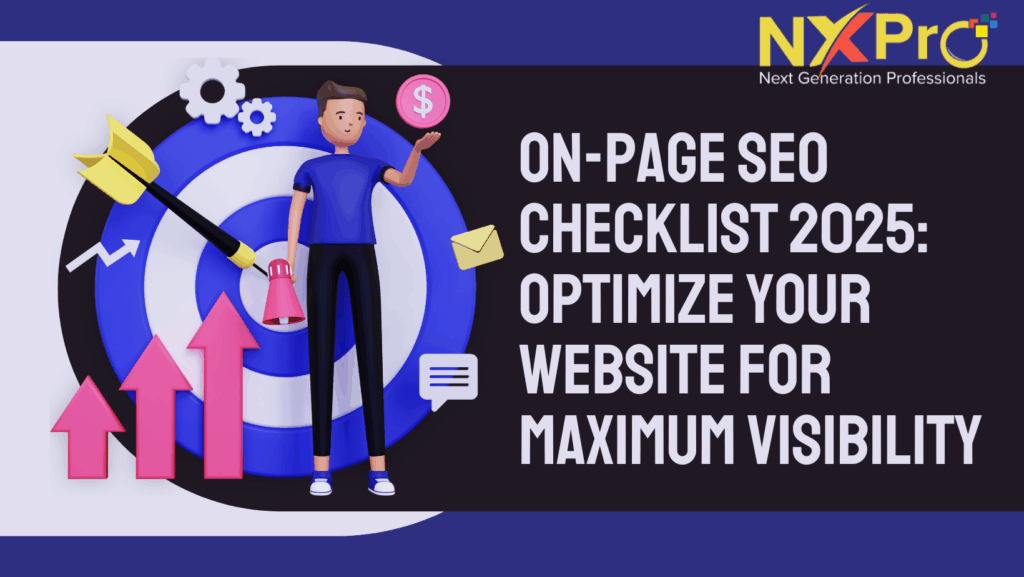
In the ever-evolving digital landscape, search engine optimization (SEO) remains one of the most powerful tools for driving organic traffic. As algorithms become more sophisticated and user expectations rise, on-page SEO continues to play a critical role in achieving higher rankings. At NXPRO, a leading social media and digital marketing agency, we understand that strong on-page SEO is the foundation of every successful online strategy. Whether you run an e-commerce store, a local business, or a service-based website, implementing a solid on-page SEO plan in 2025 will help your brand stand out and capture the right audience. What Is On-Page SEO? On-page SEO refers to optimizing individual web pages to improve search engine rankings and attract more relevant traffic. It includes all the elements that are visible on your website — from keywords, meta descriptions, and title tags to internal linking, content quality, and site speed. Unlike off-page SEO (which focuses on backlinks and external signals), on-page SEO gives you full control. It’s about ensuring your website sends the right signals to Google while delivering the best experience to your visitors. On-Page SEO Checklist 2025 1. Keyword Research & Placement Every great SEO strategy starts with the right keywords. Identify primary and secondary keywords based on your target audience’s search intent. Best Practices: Use long-tail keywords that reflect natural search queries. Include your main keyword in the title, first 100 words, headings, and conclusion. Avoid keyword stuffing — focus on natural readability. Use semantic keywords (LSI) throughout your content. Pro Tip from NXPRO: Leverage tools like Google Keyword Planner, Ahrefs, or SEMrush to find the right mix of competitive and low-competition keywords that match your audience’s intent. 2. Compelling Title Tags & Meta Descriptions Your title tag and meta description are the first things users see in search results — make them count! Tips: Keep title tags under 60 characters and include your primary keyword. Write unique meta descriptions (under 160 characters) that encourage clicks. Use action-oriented words like “Learn,” “Discover,” or “Boost.” Example: Title: On-Page SEO Checklist 2025 | NXPRO Meta: Optimize your website for maximum visibility with NXPRO’s 2025 on-page SEO guide. Learn expert tips to rank higher on Google. 3. Optimize Headers (H1–H6 Structure) Proper use of headers improves readability and helps search engines understand content hierarchy. Checklist: Use one H1 tag per page (the main title). Use H2, H3, and H4 tags for subtopics and structure. Include keywords naturally in headings. 4. High-Quality Content Creation Content remains king in 2025 — but now it’s more about user intent and value than just word count. Focus On: Writing in-depth, original, and informative content. Answering user queries directly. Adding statistics, visuals, infographics, and videos. Keeping paragraphs short and scannable. NXPRO Insight: Use AI tools for brainstorming, but ensure your content maintains a human tone and expertise-driven authenticity. 5. Internal Linking Strategy Internal links help search engines understand your site structure and distribute authority. Tips: Link to relevant pages and blog posts within your content. Use descriptive anchor text (avoid “click here”). Maintain a clean, logical linking structure. At NXPRO, we recommend adding at least 2–3 internal links per blog post to improve navigation and user engagement. 6. Optimize Images and Multimedia Visuals are great for engagement — but they can slow down your site if not optimized. Checklist: Use descriptive filenames and alt tags with keywords. Compress images using tools like TinyPNG or Squoosh. Implement lazy loading for better performance. Use WebP format for faster load times. 7. Mobile-Friendly Design With more than 70% of users browsing via smartphones, a responsive website is non-negotiable. Ensure that: Your layout adapts to all screen sizes. Fonts and buttons are easily clickable. Mobile page speed scores above 90 on Google PageSpeed Insights. NXPRO’s web design team always follows mobile-first development to ensure SEO success and a seamless user experience. 8. Page Speed Optimization Website loading speed affects both rankings and user experience. Ways to Improve: Use a reliable hosting provider. Minify CSS, JavaScript, and HTML files. Enable caching and use a Content Delivery Network (CDN). Remove unnecessary plugins and scripts. A faster site means better engagement — and higher rankings. 9. Schema Markup Implementation Adding structured data (Schema) helps Google better understand your content and show rich snippets (like FAQs, reviews, and ratings). Recommended Schema Types: Article Local Business FAQ Product Review NXPRO integrates Schema Markup into every client website to enhance click-through rates (CTR) and visibility in search results. 10. User Experience (UX) and Engagement Metrics Google now prioritizes pages that provide a positive experience. Focus on: Easy navigation Clean design Fast interaction (Core Web Vitals) Useful and engaging content When visitors stay longer and explore more pages, Google sees your site as valuable — leading to better rankings. Final Thoughts Opportunities for Businesses On-page SEO is more than just keywords and tags — it’s about creating a seamless, optimized experience for users and search engines alike. By following this 2025 On-Page SEO Checklist, you’ll set your website up for long-term success. At NXPRO, we specialize in helping businesses grow through smart SEO strategies, high-quality content, and modern digital marketing solutions. Whether you need a complete website audit, technical SEO fixes, or keyword-rich blog content, our team ensures your site ranks higher and performs better. Ready to optimize your website for maximum visibility? 👉 Contact NXPRO today and let our experts elevate your online presence with advanced SEO solutions built for 2025 and beyond.
How AI Overviews & Google’s AI Mode Are Changing CTR, Rankings, and SEO Services
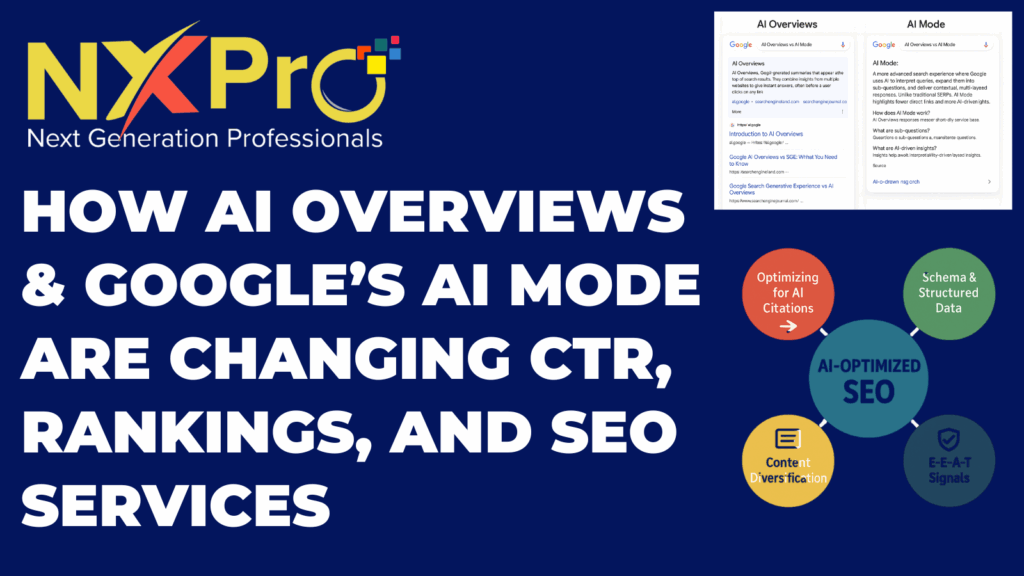
Search is transforming faster than ever. With Google’s AI Overviews and the introduction of AI Mode, the way users interact with search results has changed. For businesses and digital agencies like NXPRO, understanding how these updates impact click-through rates (CTR), rankings, and the demand for modern SEO services is critical. What Are AI Overviews and AI Mode? AI Overviews (AIO): Google’s AI-generated summaries that appear at the top of search results. They combine insights from multiple websites to give instant answers, often before a user clicks on any link. AI Mode: A more advanced search experience where Google uses AI to interpret queries, expand them into sub-questions, and deliver contextual, multi-layered responses. Unlike traditional SERPs, AI Mode highlights fewer direct links and more AI-driven insights. How They Impact CTR and Rankings CTR Decline on Traditional Listings Studies show that when AI Overviews appear, the CTR for the top organic result drops by more than 30%. Even if you rank #1, fewer users may click through because Google’s AI provides answers upfront. Ranking Signals Are Evolving Traditional SEO ranking factors like backlinks and keywords still matter, but AI Mode is pulling information from a wider range of sources. This means being in the top three positions isn’t the only path to visibility anymore. Zero-Click Searches on the Rise More users are satisfied with AI summaries, resulting in zero-click searches. Brands relying only on organic traffic will see traffic erosion unless they adapt their content. Why SEO Services Matter More Than Ever At first glance, these changes might seem like a threat. But with the right SEO services, companies can reposition themselves for success in the AI-driven landscape. Optimizing for AI Citations: It’s no longer enough to just rank; your content must be structured, authoritative, and “AI-friendly” so Google includes it in AI Overviews. Schema & Structured Data: Adding schema markup (FAQ, HowTo, product) makes content easier for AI to parse and cite. E-E-A-T Signals: Expertise, Experience, Authoritativeness, and Trust are central. Author bios, case studies, and original insights improve chances of being cited in AI answers. Content Diversification: AI Mode pulls from beyond page one. With professional SEO strategies, even mid-ranking pages can be surfaced inside AI summaries. At NXPRO, we tailor our SEO services to align with these new dynamics — focusing on structured content, AI optimization, and brand authority. Opportunities for Businesses Citation Visibility: Being quoted in AI Overviews builds credibility and still drives traffic. Long-Tail Queries: AI Mode thrives on nuanced queries, which means long-tail optimization can create new opportunities. Brand Awareness: As clicks decrease for generic terms, branded searches become more valuable. Strengthening your brand with SEO services helps ensure direct traffic growth. Diversified Channels: A smart SEO strategy also integrates YouTube, social media, and newsletters to offset traffic lost to zero-click searches. NXPRO’s Take At NXPRO, we see AI Overviews and Google’s AI Mode not as obstacles, but as opportunities to innovate. Our SEO services are designed to: Audit content for AI-triggered queries. Restructure blogs, guides, and landing pages to be AI-friendly. Strengthen brand authority so our clients are trusted sources in AI answers. Track not just rankings, but also AI citation visibility — a new SEO success metric. conclusion Google’s AI updates are reshaping how users discover and engage with content. While CTR and rankings are shifting, businesses that adapt quickly with the right SEO services can thrive in this new era. For NXPRO, the mission is clear: help brands not just rank, but also be recognized and cited by AI.
What is the Difference Between SEO, AEO, and GEO? How NXPRO Can Help Rank Your Website
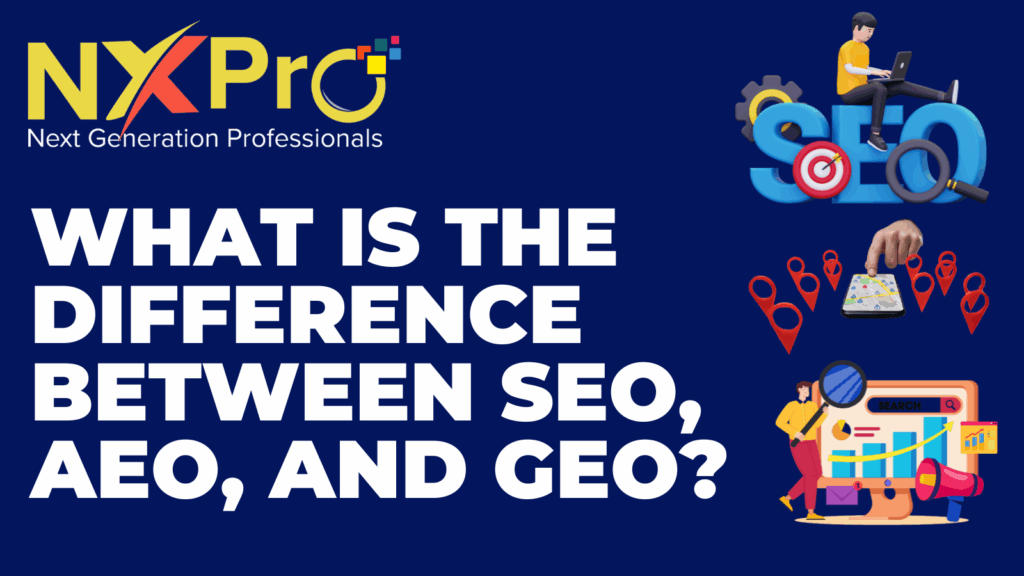
In today’s fast-changing digital world, businesses cannot rely solely on one method to gain visibility online. Search engines, voice assistants, and location-based searches are all reshaping the way people find information. That’s why you’ll often hear terms like SEO, AEO, and GEO. But what exactly do they mean, and how can they help your website rank better? Let’s break it down step by step—and see how NXPRO, a professional digital marketing agency, can help you grow your online presence. What is SEO? SEO (Search Engine Optimization) is the foundation of digital marketing. It is the process of optimizing your website so that it ranks higher on search engine results pages (SERPs) like Google and Bing. Key aspects of SEO include: On-Page SEO: Optimizing website content, titles, meta descriptions, headers, and keywords. Technical SEO: Improving site speed, mobile responsiveness, indexing, and structured data. Off-Page SEO: Building backlinks, social signals, and domain authority. Example: If someone searches “best digital marketing agency in San Francisco”, SEO helps your website appear at the top of the results. What is AEO? AEO (Answer Engine Optimization) is the new era of optimization. Instead of focusing only on search engines, AEO is about optimizing for voice assistants and AI-powered search tools like Siri, Alexa, Google Assistant, and ChatGPT. People are shifting from typing to voice search. AEO ensures your website content addresses direct, conversational queries. Key aspects of AEO include: Optimizing for featured snippets (“position zero” on Google). Using conversational keywords like “Where can I find…” or “What’s the best way to…”. Structuring content in Q&A format so that AI and voice assistants can read and deliver it easily. Example: If someone asks Alexa, “What is the best social media marketing agency near me?”, AEO ensures your business gets recommended. What is GEO? GEO (Geographical Optimization) focuses on local search and location-based visibility. It helps your business show up for people searching nearby. Key aspects of GEO include: Google Business Profile optimization (maps, reviews, photos, directions). Local keywords like “SEO services in Helsinki” or “Taxi service in Chandigarh”. NAP Consistency (Name, Address, Phone number across directories). Localized content marketing tailored for specific regions. Example: If someone searches “restaurant near me” or “best SEO company ”, GEO optimization ensures your business pops up How SEO, AEO, and GEO Work Together SEO builds your overall online visibility. AEO ensures your content is future-ready for AI and voice search. GEO makes sure your business dominates local searches. When combined, they create a powerful digital strategy that covers every type of online user—whether they’re typing, speaking, or searching locally. How NXPRO Helps Rank Your Website At NXPRO, we specialize in blending SEO, AEO, and GEO strategies to deliver top-ranking results. Here’s how we help: Advanced SEO Strategies – Keyword research, on-page optimization, technical SEO fixes, and authority-building backlinks. Voice Search & AEO Optimization – Conversational content, FAQ schema, and snippet-focused writing for answer engines. Local GEO Optimization – Google Business Profile management, local keywords, map citations, and review strategies. Data-Driven Insights – Continuous tracking, analytics, and adjustments to stay ahead of competitors. Tailored Campaigns – Whether you’re targeting global audiences or hyper-local customers, NXPRO creates a strategy that fits your business goals. With our expertise, your website won’t just rank—it will attract, engage, and convert. conclusion In the digital age, visibility means everything. While SEO keeps you strong in traditional search, AEO makes you future-ready, and GEO ensures your business thrives locally. If you want your website to rank higher, attract quality leads, and stay ahead of competitors, NXPRO is your trusted partner. Let’s grow your website together—contact NXPRO today and dominate the search results with SEO, AEO, and GEO.
SEO Services Canberra – Grow Your Business with NXPRO
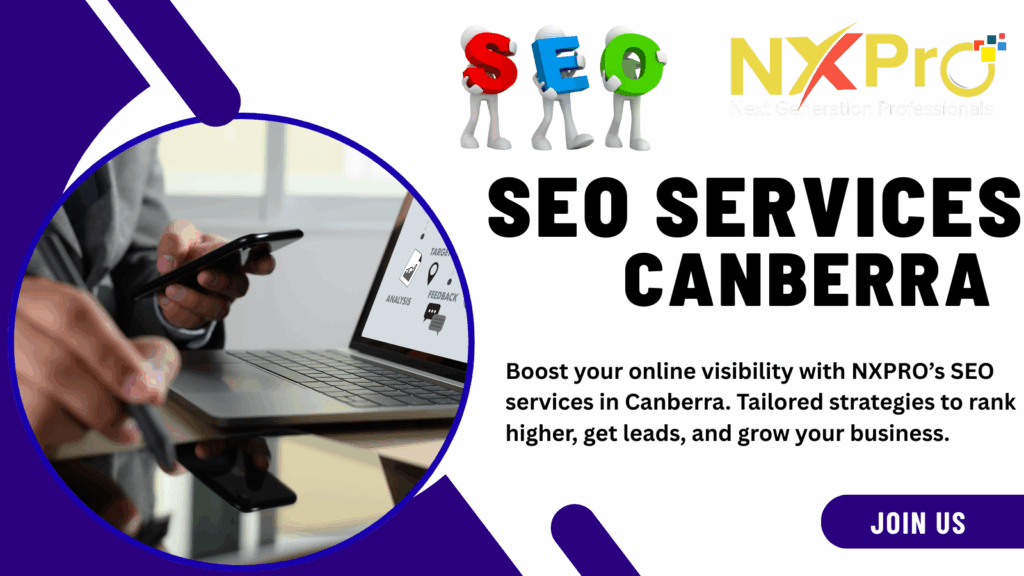
In today’s competitive digital world, every business needs to stand out online. Whether you run a local shop in Canberra or manage a large company across Australia, your visibility on search engines directly impacts your success. This is where SEO services in Canberra by NXPRO come in. At NXPRO, we specialize in delivering customized SEO strategies designed to help businesses like yours attract more visitors, generate quality leads, and boost sales. Why Choose SEO Services in Canberra? Increase Online Visibility – Appear at the top of Google search results when your customers are looking for your products or services. Attract Local Customers – Optimize your website for Canberra-based searches and build a strong presence in your local community. Drive Targeted Traffic – Get visitors who are genuinely interested in what you offer, resulting in higher conversions. Build Brand Authority – A well-optimized website builds trust and positions your business as a credible leader in your industry. Search Engine Optimization (SEO) is more than just ranking higher on Google. It’s about connecting your business with the right audience at the right time. If your potential customers cannot find your business online, they will go to your competitors instead. By investing in professional SEO services in Canberra. NXPRO – Your Trusted Partner for SEO Services in Canberra NXPRO is not just another digital marketing company. We are a results-driven agency focused on helping businesses grow through powerful SEO techniques. Our team of SEO experts combines technical knowledge, creativity, and data-driven insights to create strategies that actually deliver measurable results. We believe in transparency, ethical practices, and long-term growth. When you choose NXPRO for SEO services in Canberra, you get more than just rankings—you get a partner dedicated to your success. Our SEO Services in Canberra We offer a complete range of SEO services Canberra businesses need to thrive online. Here’s what we provide: SEO Audit & Strategy Before we begin, our experts conduct a detailed website audit to analyze your site’s performance, speed, structure, and content. Based on this, we create a customized SEO strategy that aligns with your business goals. On-Page SEO Our on-page SEO services include optimizing titles, meta descriptions, header tags, images, and internal linking. We also focus on creating SEO-friendly content that engages both users and search engines. Technical SEO A technically sound website is crucial for ranking higher. We fix issues such as broken links, site speed, mobile responsiveness, and structured data to ensure Google can easily crawl and index your site. Local SEO Local customers are searching for your services every day. With our local SEO strategies, we optimize your Google Business Profile, local citations, and geo-targeted keywords to ensure you dominate the Canberra local search results. Link Building Backlinks are a major ranking factor. Our team helps your business earn high-quality links from relevant and trusted websites to build authority and credibility. Analytics & Reporting We provide detailed monthly reports so you can see the progress of your SEO campaigns. With NXPRO, you’ll always know where your investment is going and what results it’s bringing. Why NXPRO Stands Out for SEO Services in Canberra There are many SEO agencies out there, but NXPRO stands apart because of our: Proven Results – We have helped businesses in Canberra and beyond achieve top rankings and consistent growth. Tailored Strategies – We don’t believe in one-size-fits-all. Every SEO plan is customized based on your industry and goals. Transparent Communication – No hidden costs, no jargon—just clear reporting and honest advice. Dedicated Team – Our SEO specialists are passionate about delivering results that matter. Focus on ROI – We measure success not just by traffic but by leads, conversions, and revenue growth Starter $ 300 /Month SEO audit & roadmap Google Business Profile 2 local citations/month Backlinking Contact Now Sale Growth $ 600 /Month Everything in Starter 2 new pages/posts/month Technical SEO sprints backlinks Conversion tracking & dashboard Contact Now Sale Scale $ 900 /Month Dedicated SEO Manager Location page network Digital PR & data-driven content Guest Blogging eCommerce SEO Contact Now Sale Get Started with NXPRO Today If you’re looking for reliable and result-driven SEO services in Canberra, NXPRO is here to help. Whether you’re a small local business or a large enterprise, our team will create a customized SEO strategy that delivers long-term success. Don’t let your competitors outrank you. Partner with NXPRO today and take the first step towards growing your online presence. Contact NXPRO now to discuss your SEO goals and get a free consultation. Together, let’s make your business the top choice in Canberra!
SEO Services in Adelaide
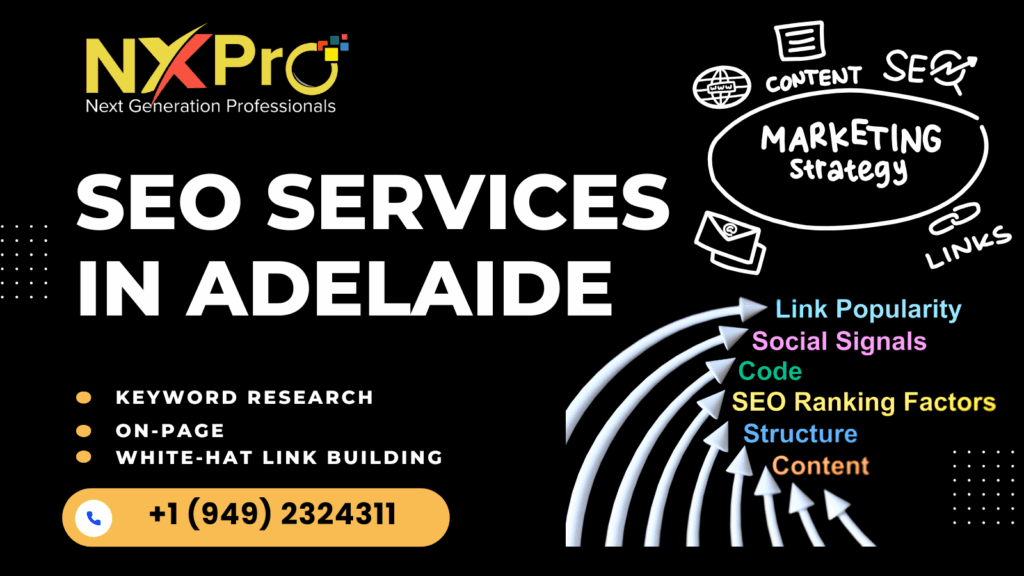
Drive more traffic, leads, and revenue with NXPRO — your local Adelaide SEO experts. Our tailored SEO strategies are designed to help Adelaide businesses stand out in competitive markets, rank higher on Google, and attract the right audience. From technical optimisation and local SEO to content creation and link building, NXPRO ensures your business not only gains visibility but also converts visitors into loyal customers. With our data-driven approach and local market expertise, we deliver sustainable results that grow your brand’s online presence and bottom line. Why Choose NXPRO as Your Adelaide SEO Agency? Adelaide’s market is competitive and localised. NXPRO combines deep technical SEO expertise with local market insights to help you rank on Google for the searches that matter — across the CBD, North Adelaide, Glenelg, Norwood, Unley, Henley Beach and beyond. What sets NXPRO apart Proven, ethical SEO: White-hat strategies aligned with Google’s guidelines. Revenue-first approach: We focus on qualified traffic and conversions, not just rankings. Transparent reporting: Clear monthly progress, KPIs, and next steps. Local expertise: Content and citations tailored to Adelaide audiences and suburbs Our Process Discovery & Goals – Understand your market, ICP, and revenue targets. Audit & Roadmap – Technical, content, and authority assessments with a 90-day plan. Foundations – Fix technical issues, structure content, and set up analytics/tracking. Build & Optimise – Execute content, links, local SEO, and CRO in agile sprints. Measure & Scale – Report on rankings, traffic quality, leads/sales, and ROI; scale what works. Our Adelaide SEO Services At NXPRO, we offer end-to-end SEO services to help Perth businesses improve visibility, attract qualified traffic, and increase revenue. From technical audits and on-page optimisation to content strategy, local SEO, and link building, our team creates tailored campaigns that deliver measurable results. SEO Audit & Strategy We start with a comprehensive audit covering technical health, content gaps, competitor landscape, and link equity. You’ll get a clear 90-day roadmap with quick wins and long-term plays. On-Page SEO On-page SEO is the foundation of every successful digital marketing strategy. At NXPRO, we optimise every page of your website to ensure it speaks the same language as search engines and your customers. Technical SEO A website that looks great on the surface but struggles behind the scenes won’t reach its full potential. That’s where NXPRO’s Technical SEO services in Adelaide come in. Local SEO If your business depends on Adelaide customers finding you online, then Local SEO is non-negotiable. At NXPRO, we specialise in helping local businesses dominate Google Maps, “near me” searches, and suburb-specific results. Link Building High-quality backlinks are one of the most important ranking factors in Google’s algorithm. At NXPRO, we provide ethical, white-hat link building services that improve your website’s authority, credibility, and search engine visibility. WooCommerce SEO Selling online is competitive, and without the right SEO strategy, even the best products can get lost in the crowd. At NXPRO, we specialise in eCommerce SEO services in Adelaide, helping businesses optimise their online stores Our Process Discover – Goals, audience, and Adelaide competitive landscape. Diagnose – Full audit + baseline metrics. Design – 90-day SEO sprint plan with timelines. Deploy – Technical fixes, on-page, content, and links. Demonstrate – Monthly reporting with actions and outcomes. Dial-Up – Iterate based on data to scale traffic and conversions. Starter $ 300 /Month SEO audit & roadmap Google Business Profile 2 local citations/month Backlinking Contact Now Sale Growth $ 600 /Month Everything in Starter 2 new pages/posts/month Technical SEO sprints backlinks Conversion tracking & dashboard Contact Now Sale Scale $ 900 /Month Dedicated SEO Manager Location page network Digital PR & data-driven content Guest Blogging eCommerce SEO Contact Now Sale FAQs How long until we see results? Most Adelaide businesses see meaningful movement in 8–12 weeks, with compounding gains over 6–12 months. Speed depends on competition, current site health, and content velocity. Do you lock clients into long contracts? No. NXPRO offers flexible agreements with performance reviews. We prefer to earn your trust with results. Can you work with our developer or in-house team? Absolutely. We collaborate seamlessly, or we can implement changes for you. Will you help us write content? Yes — from service pages to blogs, we create on-brand content mapped to high-intent keywords.
SEO Company in Perth – NXPRO

Looking for a results-driven SEO company in Perth that actually moves the needle? NXPRO helps local businesses rank higher, attract qualified traffic, and convert more customers—without guesswork. From technical SEO and local map rankings to content strategy and authoritative link building, we deliver campaigns tailored to Perth’s competitive landscape and your unique goals. Why Choose NXPRO as Your Perth SEO Agency? Local expertise: We understand Perth’s search trends, customer intent, and competitive niches across CBD, Joondalup, Fremantle, Canning Vale, Morley, Midland, Rockingham, and beyond. Strategy > tactics: Every action ladders up to a measurable growth plan—no fluff, just impact. Transparent reporting: Clear KPIs, live dashboards, and monthly insights you can act on. Technical excellence: Clean architecture, fast pages, structured data, and crawl efficiency—so Google and customers love your site. Ethical & sustainable SEO: We focus on durable, compounding results that don’t vanish with the next algorithm update. Our Process Discovery & Goals – Understand your market, ICP, and revenue targets. Audit & Roadmap – Technical, content, and authority assessments with a 90-day plan. Foundations – Fix technical issues, structure content, and set up analytics/tracking. Build & Optimise – Execute content, links, local SEO, and CRO in agile sprints. Measure & Scale – Report on rankings, traffic quality, leads/sales, and ROI; scale what works. Our SEO Services in Perth At NXPRO, we offer end-to-end SEO services to help Perth businesses improve visibility, attract qualified traffic, and increase revenue. From technical audits and on-page optimisation to content strategy, local SEO, and link building, our team creates tailored campaigns that deliver measurable results. SEO Audit & Strategy NXPRO provides comprehensive SEO audits and strategies in Perth, identifying technical issues, content gaps, and opportunities for higher rankings, increased traffic, improved conversions, sustainable business growth, and long-term online authority. Technical SEO Technical SEO is the foundation of every successful SEO campaign. At NXPRO, we ensure your Perth website is fully optimised for search engines and users alike. From site speed and mobile-friendliness to crawlability and structured data, our team fixes the hidden issues that prevent your website from ranking Local SEO For Perth businesses, appearing in local search results and Google Maps is crucial to attracting nearby customers. NXPRO specialises in Local SEO, helping your business get found by the right people in the right locations—from Perth CBD to Subiaco, Fremantle, Joondalup, Canning Vale, and beyond. Content Strategy At NXPRO, we believe content is the backbone of SEO success. Our Content Strategy & Creation services help Perth businesses attract traffic, engage users, and drive conversions. From blogs and service pages to local landing pages, we create content that resonates with both search engines and your target audience. Off-Page SEO Off-page SEO is about increasing your website’s authority, credibility, and relevance through activities outside your site. At NXPRO, we help Perth businesses earn high-quality backlinks, mentions, and partnerships that boost search rankings, drive referral traffic, and enhance overall online brand visibility. WooCommerce SEO Running a WooCommerce store is one thing; getting it found on Google is another. NXPRO specialises in WooCommerce SEO, helping Perth eCommerce businesses increase organic traffic, improve product visibility, and boost sales. From technical SEO fixes to content and conversion optimisation. Ready to Grow? Speak With NXPRO If you’re serious about sustainable growth and want a partner who’s equally committed to outcomes, NXPRO is your Perth SEO company. Let’s build an SEO engine that compounds month after month.
SEO Services Melbourne – Drive Growth with NXPRO
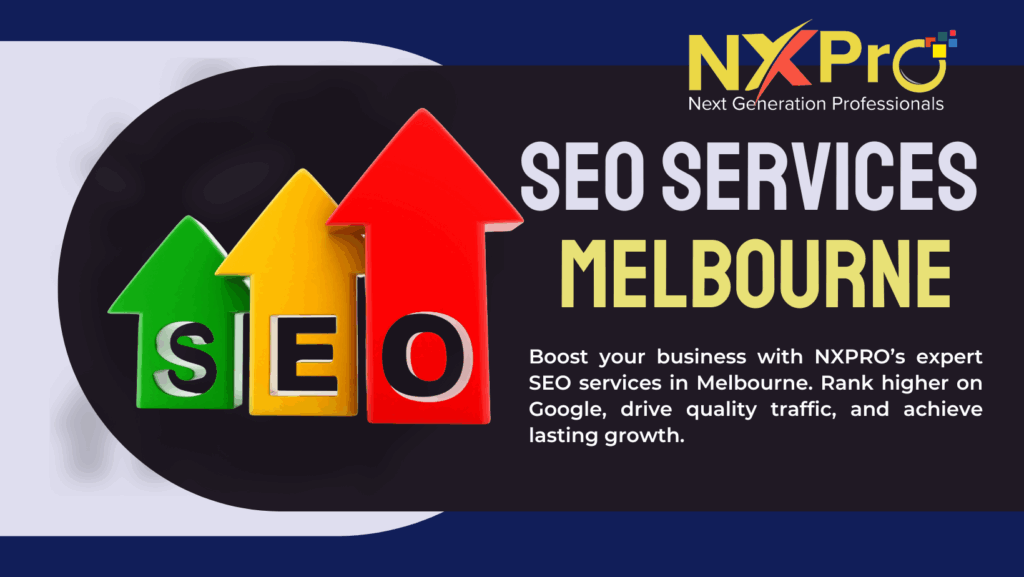
In today’s digital-first world, having a well-designed website is just the beginning. To truly succeed online, your business needs visibility on search engines where your potential customers are actively looking for products and services. That’s where NXPRO, a leading digital marketing agency, steps in with its specialized SEO services in Melbourne. Our team helps local businesses rank higher, attract quality traffic, and convert visitors into loyal customers. Why SEO Matters for Your Melbourne Business Search Engine Optimization (SEO) isn’t just about ranking—it’s about building trust, visibility, and long-term growth. In Melbourne’s highly competitive business environment, SEO can make the difference between being discovered by your ideal customer or being buried under your competitors. Local Customer Reach: With effective local SEO in Melbourne, your business appears in Google Maps and “near me” searches, helping nearby customers find you. Cost-Effective Marketing: Unlike paid ads, SEO builds sustainable traffic without continuous spending. Increased Conversions: High rankings signal credibility, which increases trust and leads to more sales. Brand Visibility: Strong SEO ensures your brand consistently shows up where your audience is searching. NXPRO – Your Trusted SEO Agency in Melbourne When you choose NXPRO for SEO services in Melbourne, you’re partnering with a results-driven agency that combines creativity, technical expertise, and data-driven insights. Our mission is to help businesses like yours dominate search engine rankings and grow revenue. We understand the Melbourne market and its unique customer behaviors, ensuring that every campaign we design resonates with your audience. From on-page SEO to off-page link building and local SEO strategies, NXPRO delivers solutions that get measurable results. Our SEO Services in Melbourne At NXPRO, we offer a complete suite of SEO services to cover every aspect of your online visibility. Here’s what we provide: SEO Audit We begin with a comprehensive audit of your website, analyzing performance, speed, structure, and existing rankings. SEO Audit We begin with a comprehensive audit of your website, analyzing performance, speed, structure, and existing rankings. Keyword Research Ranking starts with the right keywords. We perform in-depth research to find high-intent keywords your potential customers are searching for. Keyword Research Ranking starts with the right keywords. We perform in-depth research to find high-intent keywords your potential customers are searching for. On-Page SEO Meta tags (titles, descriptions) Header optimization Internal linking structure Mobile responsiveness Schema markup On-Page SEO Meta tags (titles, descriptions) Header optimization Internal linking structure Mobile responsiveness Schema markup Off-Page SEO We boost your authority by securing high-quality backlinks from reputable websites, blogs, and directories. These strategic links improve your site’s credibility and help you rank higher on Google Off-Page SEO We boost your authority by securing high-quality backlinks from reputable websites, blogs, and directories. These strategic links improve your site’s credibility and help you rank higher on Google Local SEO For businesses targeting local customers, NXPRO’s local SEO services put you on the map—literally. We optimize your Google Business Profile, citations, and local directories to ensure customers. Local SEO For businesses targeting local customers, NXPRO’s local SEO services put you on the map—literally. We optimize your Google Business Profile, citations, and local directories to ensure customers Technical SEO From improving website speed to fixing crawl errors and ensuring proper indexing, we handle all the behind-the-scenes technical aspects that impact your ranking. Technical SEO From improving website speed to fixing crawl errors and ensuring proper indexing, we handle all the behind-the-scenes technical aspects that impact your ranking. Why Choose NXPRO for SEO in Melbourne? ith so many agencies offering SEO services, why should Melbourne businesses trust NXPRO? Proven Results: We’ve helped numerous businesses achieve first-page rankings and consistent growth. Customized Strategies: No two businesses are alike; we design strategies tailored to your unique goals. Transparent Reporting: We provide clear monthly reports showing your progress, rankings, and ROI. Local Expertise: Our team understands Melbourne’s competitive landscape and customer behavior. Holistic Approach: We combine SEO with content marketing, social media, and PPC for maximum results. Get Started with NXPRO Today If you’re ready to grow your business and dominate search engine results, NXPRO is your trusted partner for SEO services in Melbourne. Whether you’re a local shop, a growing startup, or an established brand, our expert team has the knowledge and tools to take your business to the next level. Contact NXPRO today to schedule a free consultation and discover how we can help your business rank higher, attract more customers, and achieve lasting success.
SEO Services in Sydney – Why Your Business Needs NXPRO
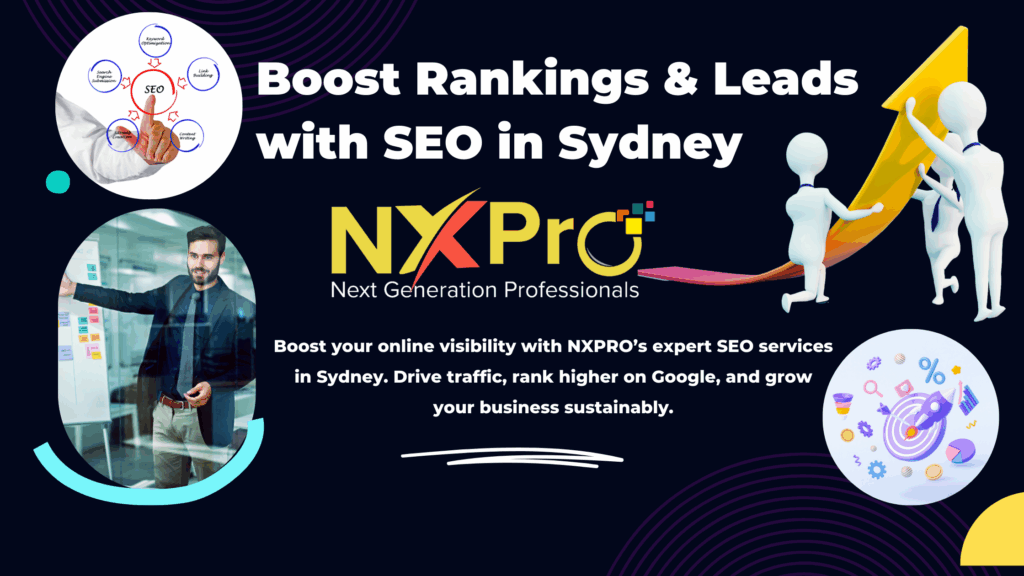
In today’s competitive digital landscape, businesses in Sydney are constantly striving to stay ahead of the competition. No matter how great your products or services are, if customers can’t find you online, you’re losing valuable opportunities. This is where SEO (Search Engine Optimization) plays a crucial role. And when it comes to delivering results-driven SEO services in Sydney, NXPRO stands out as a trusted partner. Why SEO Matters for Sydney Businesses Sydney is home to thousands of businesses across diverse industries, from small startups to established enterprises. With such a dense market, simply having a website is not enough. SEO ensures that your website ranks higher in search engines like Google, making it easier for your potential customers to find you. Increase your organic visibility Drive targeted traffic Build brand authority Generate more leads and sales For Sydney-based businesses, local SEO is especially important. Appearing in “near me” searches or Google Maps results ensures your business captures local customers at the right time. What Makes NXPRO Different? At NXPRO, we understand that no two businesses are alike. That’s why our SEO services in Sydney are tailored to your unique goals and challenges. We combine deep industry knowledge with cutting-edge SEO strategies to help businesses grow sustainably. Comprehensive SEO Audit Before implementing any strategy, NXPRO conducts a detailed website audit to uncover technical issues, keyword opportunities, and competitor insights. On-Page SEO Optimization From meta titles and descriptions to content structure, our team ensures your website pages are fully optimized for both users and search engines Local SEO for Sydney Market We specialize in local SEO services, helping businesses rank in Google Maps, local search results, and business directories. This is particularly crucial for restaurants, retail shops, clinics, and service providers in Sydney. Quality Link Building Backlinks are still one of the strongest ranking factors. NXPRO focuses on building high-quality, relevant links that improve domain authority without risking penalties. Content Strategy & Blogging We help you create valuable, keyword-rich content that resonates with your audience and strengthens your online authority. Transparent Reporting With NXPRO, you’ll never be left guessing. We provide clear, easy-to-understand reports showing improvements in traffic, rankings, and conversions. The Benefits of Choosing NXPRO’s SEO Services By partnering with NXPRO for SEO services in Sydney, you’ll gain: Higher Google rankings for targeted keywords Increased local visibility in Sydney and surrounding suburbs Improved website user experience Long-term growth in organic traffic and leads Unlike paid ads, SEO offers lasting results that continue to generate traffic even after campaigns end. It’s one of the most cost-effective marketing strategies for Sydney businesses. Final Thoughts If you’re a Sydney business owner looking to grow your online presence, now is the time to invest in SEO. With expert strategies, proven results, and a dedicated team, NXPRO is here to help you dominate search rankings and attract more customers.
